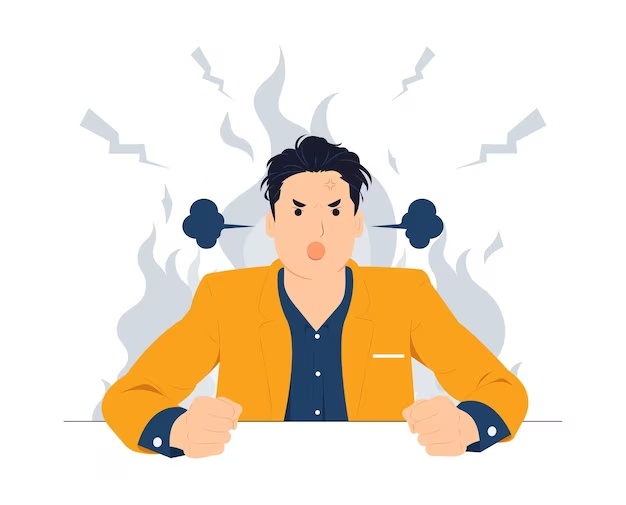"Aggression" refers to a variety of actions that could injure you, other people, or inanimate things in the surroundings physically as well as psychologically. A person's bodily or emotional harm to another is at the heart of aggression. While everyone experiences some aggression, when it becomes intense or pervasive, it could be a sign of a mental health problem, a substance use disease, or another health problem.
Aggressive behavior must require action since it is meant to hurt someone who doesn't want to be hurt; just having an aggressive thought or mood is insufficient, and accidentally hurting someone is not considered aggressive behavior. Aggressive actions include: beating, hitting, kicking, or stabbing another person, name-calling, and yelling. Passive-aggressive behaviors include ignoring someone at a social gathering or giving unintentional compliments. Instead of physically harming someone, passive-aggressive behavior frequently has the intention of allowing harm to occur.
Take help from the “Psychologist Near Me” at TalktoAngel to manage your aggression and anger issues.
Anger management
What we see to be threatening or unfair in the world depends on our individual ideas, ideals, and values. One person's extreme rage may not even register on the radar of another person.
For a variety of reasons, someone may be predisposed to anger management issues if they have had traumatic or negative events in the past. It may be more challenging to trust others and believe the best of others if you have experienced betrayal or abuse at the hands of loved ones. Anger control disorders can also be exacerbated by other mental health conditions or low self-esteem.
Our capacities for controlling and expressing rage also vary. Some people find it difficult to control their anger when it arises, and they might not be able to control it. Others may struggle to quietly and properly express their emotions.
Anger therapy
Cognitive-behavioral therapy (CBT) has been the most widely used therapy in the field of anger management therapy since it has been the subject of the majority of research.
CBT is a highly effective treatment for psychiatric and nonclinical populations because it stresses the significant connections between how we feel, the thoughts and beliefs we hold, and the behaviors we engage in.
A range of populations, including those with high blood pressure, irate drivers, inmates, college students, police officers, and parents, have benefited from CBT anger management therapies.
How does it work?
- Relaxation-based therapy: Interventions based on relaxation address the physiological and emotional aspects of rage. People learn to control their excitement and employ relaxation to deal with their rage. People can better analyze their actions and apply their conflict resolution and problem-solving abilities when they are more at ease.
- Stress inoculation; Individuals practice an internal dialogue to simulate how they might respond to a circumstance that might make them angry during stress inoculation training. They might develop a bank of coping phrases or plan how to refute unfavorable assessments of the circumstance. They can learn to approach situations with more self-control and less arousal by working on this self-guiding discourse.
- Cognitive restructuring; Beginning with an error-finding mission, cognitive restructuring helps clients identify dysfunctional or biased beliefs and thought processes that fuel anger, such as unduly personalizing others' statements or unhelpful convictions like "people never listen to me." Then, clients are assisted in developing alternate thought processes that are more beneficial, sensible, and in line with reality.
- Social skills training: Interventions in social skills are intended to lessen negative and antagonistic behaviors while also promoting improved communication and conflict resolution abilities. The client is given support in the development of their listening and assertiveness skills as well as their ability to negotiate and consider how their actions affect others. The ability to speak more effectively can lessen anger, and developing coping mechanisms for angry situations might prevent conflict from escalating.
All these techniques can also be practiced by any Best Therapist in India and they can help any person in managing their anger in a good manner. If your anger is affecting your relationship you can seek Relationship Counselling at TalktoAngel.
Some interventions could also help in managing anger for any person. These interventions can include:
- Retreat, rethink, respond: This straightforward intervention encourages clients to consider how they can defer having an angry reaction to a circumstance. A classic negative reaction pattern is to react (for example, yell at someone), retreat (remove yourself from the situation or be removed), and then, after the damage has been done, rethink (examine your actions and what you might have done differently). You can work with the client to figure out how to change their habitual response to first withdraw into their minds, reflect on the experience, and then reply more wisely in order to break this vicious cycle.
- The 7/11 technique: Clients may find it beneficial to use a tried-and-true anger management breathing method to calm down, clear their minds, and activate their parasympathetic ("rest and digest") nerve system when they are feeling tense.
- The best Therapist in India who can help you control your anger in a healthy way is called anger management counseling.


No comments yet